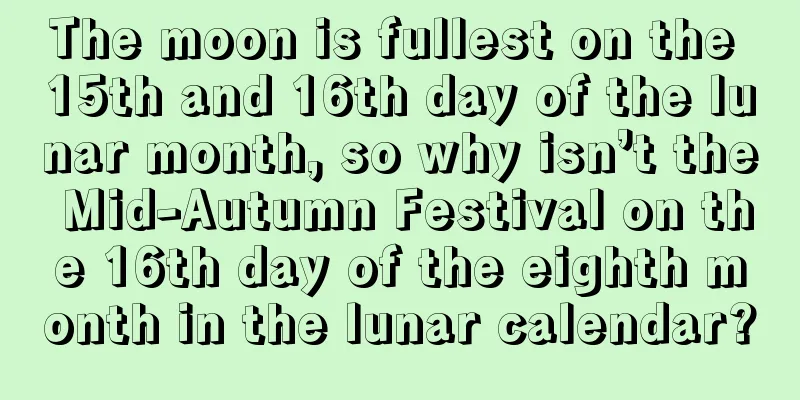The moon is fullest on the 15th and 16th day of the lunar month, so why isn’t the Mid-Autumn Festival on the 16th day of the eighth month in the lunar calendar?

The Mid-Autumn Festival in China is generally celebrated on the 15th day of the eighth lunar month. However, the moon on the 15th is never as round as that on the 16th. Why is the 16th day of the lunar calendar not the real Mid-Autumn Festival? The editor will reveal the answer to you now! The weather gradually gets cooler in the eighth month of the lunar calendar, the autumn breeze brings a refreshing coolness, and the sweet-scented osmanthus fills the air. Mr. Shui Mo website has carefully compiled detailed information about the eighth month of the lunar calendar in 2020 (9.17-10.16). If you need to know more, please follow Mr. Shui Mo website!Why is the moon on the 15th less round than on the 16th?Official explanation:On the first day of the lunar calendar, we cannot see the moon, which is called "new moon" or "shuo"; Around the 15th day of the lunar calendar, we see a round moon, which is called a "full moon" or "wang". According to the lunar calendar, the day of "Shuo" is the first day of every month. But on the same first day of the month, the "new moon" may occur in the early morning, or in the morning, afternoon, or evening, and each synodic month itself can be of varying lengths. In this way, the "full moon" when the moon is at its fullest can occur as early as the night of the 14th day of the lunar calendar and as late as the morning of the 17th day of the lunar calendar. However, since the "new moon" always falls on the first day of each lunar month, it takes an average of 14 days, 18 hours and 22 minutes after the "new moon" to reach the "full moon". Therefore, the "full moon" when the moon is the fullest mostly occurs on the fifteenth and sixteenth days of the lunar calendar, with the sixteenth day being the most common. Popular explanation—— Our current lunar month is 30 days. But the moon takes 29 days, 12 hours, 44 minutes and 2.8 seconds to orbit the earth. The difference between the two is nearly 12 hours. There may be deviations on the first day of each month, and the deviation will be even greater after fifteen days. The fullest moon is likely to appear 15.5±1 days away from the first day of the month. Why is Mid-Autumn Festival on August 15th and not at other times?According to the "Book of Zhou", in the ancient Chinese calendar, there are four seasons in a year, each season has three months, which are called the first month, the second month and the last month respectively. Because the second month of autumn is called Zhongqiu, and because the fifteenth day of the eighth month of the lunar calendar is in the middle of August, it is called "Mid-Autumn Festival". It was not until the early Tang Dynasty that the Mid-Autumn Festival became a fixed festival."The New Book of Tang, Volume 15, Records, Chapter 5, Rituals and Music 5" records that "In the middle of spring and mid-autumn, sacrifices are offered to King Wenxuan and King Wucheng" and "In the 19th year of Kaiyuan, the temple of Taigong Shangfu was first established, with Zhang Liang, Marquis of Liu, as its partner. Sacrifices are offered to it on the first five days of mid-spring and mid-autumn, with the system of sacrificial animals and music as written." According to historical records, the ancient emperors worshipped the moon on the 15th day of the eighth lunar month, which happened to be the middle of the three autumns, hence the name "Mid-Autumn Festival"; and because this festival is in August, it is also called "Autumn Festival", "August Festival", "August Meeting" and "Mid-Autumn Festival"; there are also beliefs and related customs of praying for reunion, so it is also called "Reunion Festival" and "Daughter's Festival". Because the main activities of the Mid-Autumn Festival are all centered around the "moon", it is also commonly known as the "Moon Festival", "Moon Eve", "Moon-Chasing Festival", "Moon-Playing Festival" and "Moon-Worshiping Festival"; in the Tang Dynasty, the Mid-Autumn Festival was also called "Duan Zheng Yue". The popularity of the Mid-Autumn Festival began in the Song Dynasty. By the Ming and Qing Dynasties, it had become as famous as New Year's Day and became one of the major festivals in my country. There are roughly three theories about the origin of the Mid-Autumn Festival: it originated from the ancient custom of worshiping the moon and singing and dancing under the moon to find a mate; and it also originated from the ancient custom of worshiping the land god in autumn. The fifteenth day of the eighth lunar month every year is the traditional Mid-Autumn Festival. This is the middle of the autumn season, so it is called Mid-Autumn Festival. In the Chinese lunar calendar, the year is divided into four seasons, and each season is divided into three parts: Meng, Zhong, and Ji. Therefore, the Mid-Autumn Festival is also called Zhongqiu. The Mid-Autumn Festival in Ningbo is on August 16th!Legend 1: Gou Jian's filial piety to his mother <br /> The ancient city of Juzhang is located in the area of Wangjiaba Village, Cicheng Town, Jiangbei District. According to historical records, Juzhang City was first built in the fourth year of King Yuan of Zhou Dynasty and was built by Gou Jian, King of Yue. In the past, the mother of King Gou Jian of Yue lived here for a long time. Every August 16th, King Gou Jian would celebrate his birthday with his mother. His mother would first teach her son about his mistakes, and then the parents would watch the moon together with their son. Once this story spread, people rushed to follow suit and regarded August 16 as the day to listen to teachings and accompany elders to appreciate the moon. This tradition has lasted for nearly two thousand years. The local county annals record: "The mother of the King of Yue was born on August 16, so Siming regards the 16th as Mid-Autumn Festival."Legend 2: Song Gaozong took refuge <br /> According to Wang Zhuo's notes "Autumn Lantern Collection·Unique Customs" during the Qianlong period, "Cixi takes August 16 as the Mid-Autumn Festival. It is said that Song Gaozong fled south and was pursued by the Jin army. During the Mid-Autumn Festival, he took refuge in the area. The residents could not bear to have a feast, so they changed the date to the next day, and it became a custom." It is said that when Song Gaozong Zhao Gou's ship arrived at Zheng's house in Quhuitang, it was August 15th. The local people could not bear to celebrate the Mid-Autumn Festival on the day when the emperor arrived to escape, so they postponed the Mid-Autumn Festival to the next day. A Ningbo folk song goes: "A mud horse crosses the river on King Kang's back, and the moon hides in Qutang during the Mid-Autumn Festival. If the moon is not full on the 15th, it will be brighter on the 16th." Since then, for more than 800 years, the people in Xiapu and Longshan areas have inherited the custom of celebrating the Mid-Autumn Festival on August 16th, which has gradually become a Mid-Autumn Festival custom in eastern Zhejiang. Legend 3: Shi Hao said (this is the most widely circulated one) Legend about Shi Hao, the right prime minister of Southern Song Dynasty and a native of Mingzhou: Shi Hao missed the deadline. Prime Minister Shi Hao was the teacher of Song Xiaozong and was named King of Yue. Zhuzhou was his garden. Every year on the 15th day of the eighth lunar month, during the Mid-Autumn Festival, he would rush back to Ningbo from the capital Lin'an (Hangzhou) to reunite with his relatives, have fun with the people, race dragon boats on Yuehu Lake, admire the bright moon, eat moon cakes, and celebrate the reunion together. According to the "Yinxian Tongzhi·Literature·Customs" of the Republic of China, "Shi Hao returned home from Lin'an to celebrate the festival. On the way back, his horse stumbled and was injured. He stayed overnight in Shaoxing and arrived on the 16th. Therefore, the people waited until this day to celebrate the festival." In other words, because of some small accident, Shi Hao returned home a day late. He thought: It's over, I will miss the Mid-Autumn Festival. But when he returned to Ningbo, everyone was waiting for him to celebrate the Mid-Autumn Festival together. Therefore, in order to allow him to return home to celebrate the Mid-Autumn Festival with peace of mind in the future, Ningbo set the Mid-Autumn Festival on August 16th. |
Recommend
Can I get married on the fifth day of the fourth lunar month in 2019?
If you want to know more about the dates in April...
What time is auspicious or inauspicious on the second day of the eleventh lunar month in 2021? Which time is auspicious?
The eleventh month of the lunar calendar has arriv...
When is the Summer Solstice in 2021? Is it possible to get married on the Summer Solstice?
Deer antlers fall off, cicadas start to chirp, and...
What is the month, day, hour, minute and second of Frost Descent in 2021? How to calculate the frost date
Frost Descent, the eighteenth solar term among the...
What day is the Lower Yuan Festival in 2019? Is it true that girls born on the Lower Yuan Festival are unlucky in marriage?
The Lower Yuan Festival is on October 15th every y...
How many days are left until Teachers' Day 2021? In which year did Teachers' Day begin?
Teachers' Day aims to recognize the contributi...
Is March 30th of the lunar calendar in 2019 an auspicious day?
Is March 30th of the lunar calendar in 2019 an aus...
Is it possible to pray for an offspring on the sixth day of the ninth lunar month in 2019? When is the due date?
Other names for September include the Chrysanthemu...
Is the 18th day of the 12th lunar month 2017 a good day? Is it suitable for renovation and groundbreaking?
As the year draws to a close, when most people are...
What month is the eleventh month in the lunar calendar? Does the eleventh month in the lunar calendar of 2021 have 30 days?
The lunar months of each year are also divided int...
Do's and Don'ts on the 11th day of the fourth lunar month in 2020, and analysis of the auspiciousness and inauspiciousness of the time!
There are twelve hours in a day, and the auspicio...
What is the nickname of the first month of the lunar calendar? Will it be a cold winter during the Spring Festival in 2020? Will it snow?
Introduction: The first month of the lunar calenda...
Is it not suitable to repair the grave on the fourth day of the twelfth lunar month in 2020? Analysis of the hexagram on January 16, 2021
Introduction: Repairing a grave is also an importa...
Is March 11, 2018 a suitable day to start a business? What is the fortune today?
Opening a business is a big deal for many people. ...
2017 Leap June 30th Hour Lucky and Unlucky Hours Query
The Fortune Teller website has carefully compiled...









